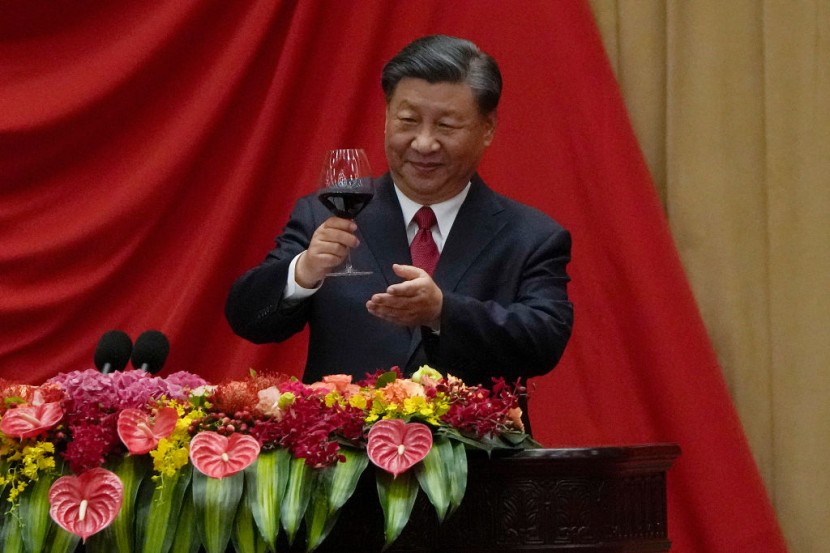
Chinese President Xi Jinping made an offer to enhance international firms' access to China's market and provide over $100 billion in new financing for developing economies.
This announcement came as he inaugurated a forum dedicated to his renowned Belt and Road infrastructure policy on Wednesday, as per ABC News.
Xi Jinping's Vision of Global Cooperation at the Belt and Road Forum
In an era marked by geopolitical tensions and economic uncertainties, Chinese President Xi Jinping took the stage at the Belt and Road Forum, offering a vision of cooperation and mutual benefit that transcends ideological confrontations and bloc politics.
Speaking before a gathering of world leaders, Xi emphasized China's commitment to fostering economic ties and supply-chain stability while implicitly opposing unilateral sanctions and economic coercion.
More than 150 countries and over 30 international organizations have endorsed the Belt and Road Initiative (BRI), showcasing its appeal as a global platform for development.
Xi's words echoed the core principles of the BRI - cooperation, mutual benefit, and economic interdependence. The BRI, also known as the "New Silk Road," represents one of the most ambitious infrastructure and economic development projects in modern history.
It encompasses vast networks of roads, railways, ports, and energy infrastructure designed to connect China to Europe, Africa, and beyond. However, it has not been without controversy, with some nations expressing concerns over the initiative's potential for debt trap diplomacy and environmental impact.
This year's Belt and Road Forum saw fewer foreign leaders in attendance compared to previous summits, indicating a waning interest in the project. Italy, the only G7 nation participating in the BRI, chose to exit the agreement and did not send a leader to the event, reflecting a growing skepticism about the initiative's long-term implications.
Despite the drop in attendance, several notable world leaders were present, including Russian President Vladimir Putin, Indonesian President Joko Widodo, Hungarian Prime Minister Viktor Orban, Egyptian Prime Minister Mostafa Madbouly, Kenyan President William Ruto, and Chilean President Gabriel Boric.
Putin, subject to an International Criminal Court arrest warrant for alleged war crimes in Ukraine, expressed support for China's vision of economic cooperation, emphasizing the desire for equal and mutually beneficial collaboration.
The BRI has had a significant impact on global infrastructure development, bringing power plants, roads, railways, and ports to regions worldwide. It has deepened China's relations with nations across Africa, Asia, Latin America, and the Middle East, according to Yahoo News.
China's Financial Sustainability
Concerns have been raised about the impact of the substantial loans supporting these projects on poorer countries. Some of these countries are facing difficulties in repaying their debts and are consequently relinquishing control of their assets to China.
In response to these challenges, President Xi pledged to inject substantial funding into the BRI, with two Chinese-backed development banks providing financial support.
Additionally, China intends to remove restrictions on foreign investment access in the manufacturing sector and open up cross-border trade and investment in services, as well as expand market access for digital products.
These measures signify China's commitment to improving the sustainability and viability of the BRI, addressing concerns about debt burdens and paving the way for greener, more environmentally friendly projects.
The Belt and Road Forum welcomed representatives from more than 130 primarily developing nations, with over 20 heads of state and government in attendance.
Notably, Vladimir Putin's presence underlines China's support for Russia amid its diplomatic isolation due to the conflict in Ukraine. The BRI is regarded by some as a potential path to a more multipolar world, promoting economic cooperation and shared development.
It is seen as an opportunity to address global infrastructure deficits and bring prosperity to previously neglected areas, as noted by UN Secretary-General António Guterres. Critics, however, have accused China of engaging in "debt trap" diplomacy, providing loans that governments are unable to repay, ultimately leading to Chinese control of assets.
A frequently cited example is Sri Lanka's Hambantota port, which was leased to a Chinese company for 99 years after Sri Lanka struggled with the debt incurred during its construction.
The Belt and Road Initiative is at a crossroads. After a decade of significant projects that enhanced global trade but raised concerns about debt and the environment, the initiative is evolving to become smaller and more sustainable. Experts argue that the forum will be a crucial platform to address issues related to the initiative's debt burden and its environmental impact.
As the world grapples with economic uncertainties and political divisions, China's commitment to a vision of global cooperation through the Belt and Road Initiative offers a glimmer of hope.
While the BRI is not without its challenges, its emphasis on cooperation, mutual benefit, and sustainability aligns with the aspirations of many nations, providing a pathway towards a more interconnected and prosperous world, MSN News reported.








